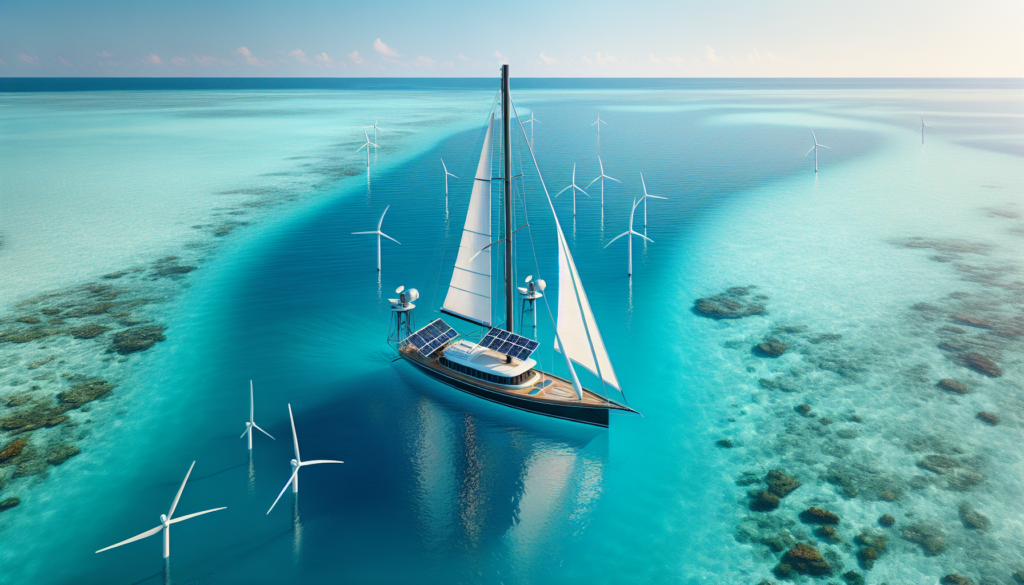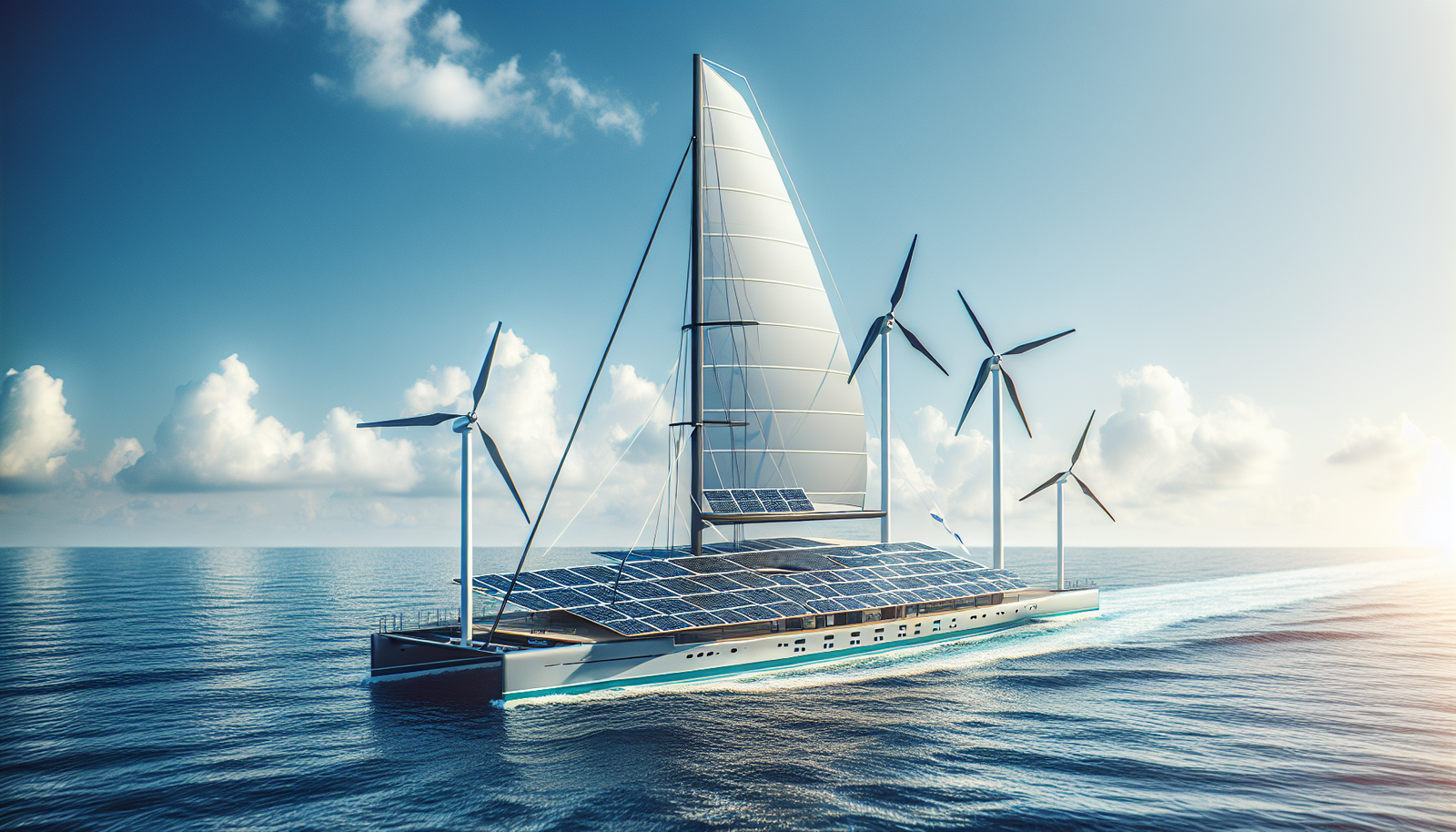As an ardent sailor, you’ve experienced the ocean’s raw beauty, its calming stillness, and its wild fury. “sustainable sailing: Eco-Friendly Strategies For Sailors” offers a comprehensive guide on how to respect and preserve these precious waters. The article will equip you with valuable knowledge and innovative strategies to make your seafaring experience more sustainable and kinder to the marine environment. It’s all about minimising your impact, reducing waste, and inspiring others to follow suit. Because to truly enjoy the magic of the sea, we need to protect and preserve it for generations to come.

Understanding the Impact of Sailing on the Environment
Sailing, while a wonderful way to connect with nature, does have its environmental impact. It’s important to understand these impacts in order to lessen your footprint as a sailor and work towards a more sustainable hobby.
The carbon footprint of traditional sailing
While they might seem inherently eco-friendly, traditional sailing boats are not without their carbon footprint. The production of the sails, ropes, and boat itself all contribute to carbon emissions. Depending on the materials used for construction, the lifespan of the vessel, and the way it is disposed of, a boat can leave a significant carbon footprint long before it hits the water. It’s crucial to recognize this impact and consider it when choosing your craft.
Consequences of irresponsible sailing behavior on marine ecosystems
Human activity on the water can disrupt marine ecosystems in various ways. Irresponsible behaviors, such as littering, anchoring in sensitive areas, or disturbing wildlife can have detrimental effects. Excess noise can disrupt marine life in the vicinity, and the improper disposal of waste can introduce pollutants into the water, harming the flora and fauna.
The problem of plastic pollution from boats
Another substantial problem is the contribution of plastic pollution from boats. From plastic bottles and bags to plastic boat parts, these non-biodegradable materials can end up in the water and cause severe harm to marine life. It’s crucial that all sailors are mindful of their plastic usage and waste disposal.
Green Boating Basics
Adopting green boating habits can considerably minimize your environmental impact. Below are some key strategies you can follow.
Choosing environmentally-friendly boat materials
Choosing a boat constructed from environmentally-friendly materials is a major step toward sustainable sailing. Options such as boats made from recycled materials, natural fibers, or biodegradable resins are increasingly available. They may require a larger upfront investment, but the long-term environmental benefits are unquestionable.
The benefits of sail power over motor power
While motorized boats are often faster and more convenient, they contribute to greenhouse gas emissions and their noise can disturb marine life. Conversely, sailboats harness the wind, providing a quiet, carbon-free form of transportation that allows you to enjoy the seascape without damaging it.
Regular maintenance to prevent fuel leaks
For those using motorized boats, regular maintenance is a must to prevent fuel and oil leaks, which can be catastrophic for marine life. Apart from being an environmental responsibility, regular maintenance also ensures your boat’s longevity and safety.
Eco-Friendly Navigation and Route Planning
Responsible sailing reaches beyond the boat and touches on the way you navigate.
Using ocean currents and wind patterns for fuel-efficient routes
Understanding and utilizing natural elements like ocean currents and wind patterns can help design fuel-efficient routes. By paying attention to nature, you get to save on fuel, decrease emissions, and make your sailing experience more aligned with the ecosystem.
Avoiding sensitive marine areas and protected zones
Certain areas are home to vulnerable species or delicate ecosystems. It’s important for sailors to be aware of these locations and steer clear of them to avoid disruption, even if it means taking a slightly longer route.
Use of digital tools and apps for green navigation
The use of digital tools, such as GPS, climate apps, and route planning software, can help sailors plan more eco conscious routes. They provide valuable information on current conditions, wave heights, wind direction – all potentially useful for conserving fuel and minimizing impact.

Energy Efficient On-Board Systems
Sustainable sailing also includes the choice of your on-board systems.
Solar powered systems for boats
Embracing renewable energy sources greatly minimizes the environmental impact. Solar power for lighting, navigation systems, and even cooking appliances is becoming increasingly popular among eco-conscious sailors.
Wind generators and hydro-generators for marine use
Wind generators and hydro-generators effortlessly harness the natural power of your surroundings. They offer a reliable source of power without the environmental costs, making them an excellent choice for long voyages.
Energy-efficient appliances and lighting for boat cabins
Energy-efficient appliances and LED lighting, while seeming like small details, can substantially reduce energy consumption. This, in turn, reduces the need for fossil fuel use onboard.
Sustainable Waste Management Onboard
Managing waste responsibly is a fundamental part of caring for our oceans.
Best practices for waste storage and disposal at sea
While on board, limit waste generation and make sure to collect and store all waste until it can be disposed of properly ashore. Never throw anything overboard, particularly plastics, which are incredibly harmful to marine life.
Managing sewage and gray water responsibly
Dealing with sewage and gray water responsibly is essential to prevent water contamination. Install appropriate treatment systems on your boat or ensure sewage is held until it can be properly treated on land.
Reduce, Reuse and Recycle strategies for sailors
Implement the three R’s: reduce, reuse, and recycle. Reduce waste by choosing products with less packaging, reuse containers and other items instead of throwing them away, and recycle the waste you do produce.
Eco-Friendly Cleaning Products for Boats
The products we use to clean our boats can have a direct impact on the marine environment.
Dangers of common cleaning chemicals to marine life
Many cleaning products contain harmful chemicals that can affect the water quality and harm marine life when they are washed off the boat.
Choosing non-toxic, biodegradable boat cleaning products
Shift to non-toxic and biodegradable cleaning products, as they are less harmful to the ocean when washed overboard. Many effective eco-friendly options are available on the market today.
Do-it-yourself natural cleaning solutions for boats
Homemade cleaning solutions, using everyday household ingredients like vinegar, baking soda, and lemon, can be a cost-effective and eco-friendly alternative. They offer a safe and sustainable way to keep your boat clean and shiny.
Responsible Fishing and Shellfishing
If fishing is a part of your sailing activities, make sure it’s done responsibly.
Appropriate fishing techniques to avoid overfishing
Adopt appropriate fishing techniques to prevent overfishing and the destruction of marine habitats. Catch only what you need and respect minimum size and bag limits.
Understanding and respecting season and size regulations
Season and size regulations are in place to ensure fish population stability. By adhering to them, you are directly contributing to the sustainability of our marine resources.
The impact of releasing invasive species and potential solutions
Releasing bait or catch from different waters contributes to the spread of invasive species that can destabilize local ecosystems. To avoid this, dispose of leftover bait on land and never release fish or shellfish into unfamiliar waters.
Protecting Marine Animals and Biodiversity
The vibrant biodiversity of marine life makes being on the water such an enriching experience.
Practices to avoid disturbing marine animals
As sailors, we should always strive to watch marine animals from a safe distance and avoid behavioral disturbances. Avoid surprising or cornering these creatures, be it dolphins, whales, seals, or sea turtles.
Importance of reporting marine animal sightings and strandings
Sailors can help scientists keep track of animal populations and identify threats by reporting marine animal sightings and strandings. This can be a significant contribution to preserving the ocean’s biodiversity.
Understanding and avoiding invasive species
Understanding which species are native and which are potentially invasive can help prevent the damage caused by non-native species. Avoid taking any plant or animal from its natural habitat.
Educating Others About Sustainable Sailing
Spreading the word about sustainable sailing practices is equally important.
Sharing sustainable practices with other sailors
Sharing your knowledge with fellow sailors increases the adoption of sustainable practices. Whether face-to-face or via online forums, make an active effort to share what you’ve learned and how you’re making a difference.
Engaging in community outreach and clean-up activities
Participating in and promoting local clean up operations not only results in cleaner waterways but also raises environmental awareness within the boating community.
Promoting eco-friendly sailing through social media and blogs
Using digital platforms to promote eco-friendly sailing can reach a broader audience. Share your experiences, tips, and successes, inspiring others to adopt a more sustainable approach to sailing.
Legislation and Rules for Green Boating
Being aware of regulations helps to ensure we make informed, eco-friendly decisions.
Understanding local and international environmental regulations
These regulations are a framework for sustainable practices at sea. Understanding the rules in your region and globally can help you comply and contribute to marine conservation.
Consequences of breaching marine conservation laws
Breaching these laws can have severe legal and environmental consequences. It harms the very places we love to sail and can result in penalties or restrictions.
Role of marine organizations in promoting sustainable boating practices
Many organizations actively work to promote sustainability within the boating community. They provide resources, drive policy changes, protect marine areas, and can be a wealth of information for aspiring green sailors.
In conclusion, sustainable sailing is about treating the marine environment with respect. It’s about making informed choices, adopting environmentally-friendly habits, and spreading knowledge and awareness. By committing to these eco-friendly practices, you can sail into a brighter, cleaner future for our oceans.

